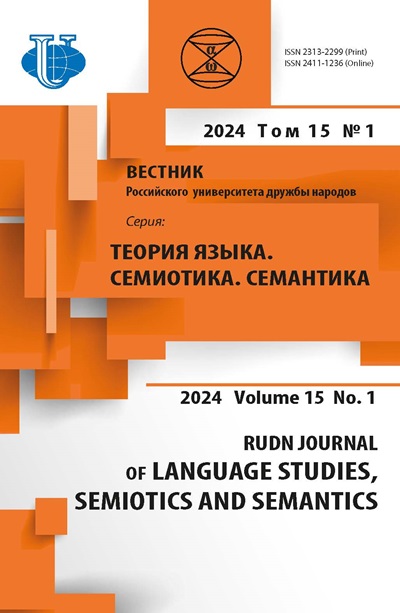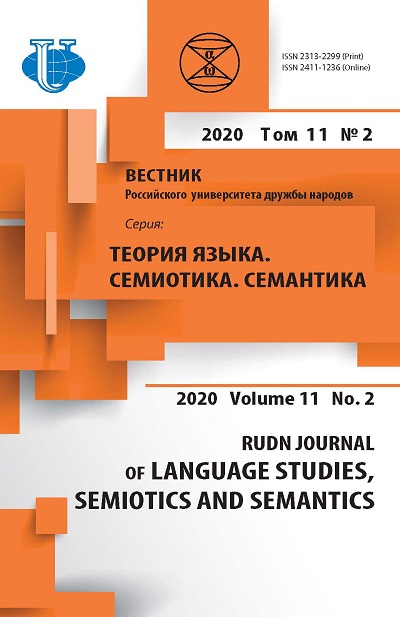Axiology of Proverbs in the Focus of the Problem of Cognitive-discursive Modeling of Semantics of Russian Proverbs
- Authors: Semenenko N.N.1
-
Affiliations:
- Starooskolsky branch of Belgorod state national research University
- Issue: Vol 11, No 2 (2020): Semantics of Universal and Specific in the Language and a Text
- Pages: 213-232
- Section: SYMBOLISM AND METALANGUAGE IN LINGUISTICS
- URL: https://journals.rudn.ru/semiotics-semantics/article/view/23578
- DOI: https://doi.org/10.22363/2313-2299-2020-11-2-213-232
Cite item
Full Text
Abstract
The article is devoted to the analysis of the problem of determining the value factor in the semantic structure of proverbs in relation to the problem of cognitive-pragmatic modeling of proverbial semantics. The relevance of the appeal to the value component of paremic semantics is due to the approach to solving the problems of semantics of signs of indirect-derived nomination in the system “Language - text - discourse”, which has already become traditional for anthropocentric linguistics. Paremia is considered as a syncretic sign that combines the properties of a texteme (a language sign) and a statement (a discursive unit). Many features of it’s speech implementation are due to the combination of the properties of a mini-text with a “folded” semantic structure and a discourse unit that contributes to the formation of meaning in it’s space. In the course of determining the essence of the approach to the description of the problem specified linguophilosophical cultural status values, and proposes the author's concept define cognitive-pragmatic status values as linguaitaliana units allocated in the cognitive basis of the values of folk aphorism and implemented in a pragmatic component paramedische values. The description of axiological paremic representation is carried out in line with the cognitive-pragmatic approach to the distinction between axiological and evaluative in the semantic content of proverbs. Grounded in the study of the model description of the axiological accentually pareticheski semantics is illustrated by a thematic group of proverbs and in describing the discursive potential of the proverbs included in the context. The relevance of the study is due to the consideration of paremic semantics as a field of linguosinergic interaction of value and evaluation, expressed in the semantic structure of proverbs.
Keywords
About the authors
Natalia N. Semenenko
Starooskolsky branch of Belgorod state national research University
Author for correspondence.
Email: nsemenenko@yandex.ru
Professor of the Department of Philology
18, Solnechnyi, Stary Oskol, Belgorod region, Russian Federation, 309502References
- Serebrennikov, E.F. (2011). Introduction In Linguistics and axiology: value entomemiometria meanings: collective monograph. Moscow: THESAURUS. pp. 3—6. (In Russ.).
- Sidorov, V.A. (2009). Axiology of journalism: experience of formation of the discipline. St. Petersburg. (In Russ.).
- Arutyunova, N.D. (1988). Types of linguistic meanings: Evaluation. Event. Fact. Moscow: Nauka. (In Russ.).
- Wolf, E.M. (2002). Functional semantics of evaluation. Moscow: Editorial of the USSR. (In Russ.).
- Ivin, A.A. (2010). Modern Axiology: Some Urgent Problems. Philosophy Journal, 1(4), 66— 78. (In Russ.).
- Kvashina, V.V. (2013). Problems of axiology in modern linguistics. Bulletin of Chelyabinsk State Pedagogical University, 2, 181—189. (In Russ.).
- Corina, N.B. and all (2014). Language worldview and cognitive language priorities. Nitra: UKF. 2014.
- Kotsyubinskaya, L.V. & Kuzina, O.A. (2015). On the question of axiology in linguistics. Vestnik of Pushkin Leningrad State University, 1(7), 59—66. (In Russ.).
- Pavlov, S.G. (2013). Linguistic-Axiological model of man: scientific-axiological aspect, Bulletin of the Minsk University. Meganewton, 2, 56—58. (In Russ.).
- Suleymanova, Y.O. (2017). Value picture of the world of Russian culture in the paremiological context (by the material of Proverbs with components-names of natural elements). Universum: Philology and art history, 6(40). URL: http: 7universum.com/ru/archive/item/4930 (accessed: 10.01.20).
- Bayramova, L.K. (2014). Proverbs in the “Axiological phraseological dictionary of the Russian language: dictionary of values and anti-values”. Vestnik of Yaroslav the Wise Novgorod State University, 77, 10—11. (In Russ.).
- Betulina, A.V. (2007). Representation of the value picture of the world Russian people in proverbs, sayings and proverbs-sayings expressions. Vestnik of Yaroslav the Wise Novgorod State University, 44, 59—61. (In Russ.).
- Bezkorovaynaya, G.T., Lomakina, O.V. & Makarova, A.S. (2017). Linguistic and Cultural Potential of Phraseology: Common and Nationally Specific Features (Based on the Phraseologisms with the Symbolic Component Меч / Sword / Le Glaive In Russian, English and French). Philology and culture, 4(50), 6—10.
- Lomakina, O.V. & Mokienko, V.M. (2016). Cognitive potential of Rusin proverbs compared with those in the Russian and Ukrainian language. Rusin, 3(45), 119—128.
- Nelyubova, N., Hiltbrunner, V.& Ershov, V. (2019). The Reflection of the Hierarchy of Values in the Proverbial Fund of the Russian and French languages. Russian Journal of Linguistics, 23(1), 223—243. doi: 10.22363/2312-9182-2019-23-1-223-243.
- Tanaseychuk, E.Y. (2008). Principles of phraseology description aimed at defining cultural values (based on Chinese, English and Russian Proverbs). Vestnik of Pomor University. Series “Humanitarian and Social Sciences”, 7, 57—60. (In Russ.).
- Bolotin, M.A. & Shabashev, E.A. (2013). Cognitive aspect of value meaning in colour idioms, IKBFU's Vestnik. Ser. Philology, Pedagogy, and Psychology, 2, 2—28. (In Russ.).
- Alefirenko, N.F. (2013). Sense as linguistic philosophic phenomenon, Tomsk State University Journal of Philology, 21, 5–14. (In Russ.).
- Mokienko, V.M., Nikitina, T.G. & Nikolaeva, E.K. (2010). Large dictionary of Russian Proverbs. Moscow: ZAO “OLMA Media Group”. (In Russ.).
- Dahl, V.I. (2005). Proverbs of the Russian people. Moscow: Eksmo-NNN. (In Russ.).
- Alefirenko, N.F. (2014). Value-semantic paradigm of the word In The Main trends in the development of Russian and other Slavic languages in the modern word: proceedings. University of Cyril and Methodius in Trnava. Brno. no 21. P. 6—17.
- Alefirenko, N.F. (2019). Idiomatic “tuning fork” of the cognitive-pragmatic register in the language picture of the world In Phraseology in the language picture of the world: cognitivepragmatic registers: Sat.science.proceedings of the 4th International scientific conference on cognitive phraseology (Belgorod, March 26—27, 2019). Belgorod: LLC “Epicenter”. pp. 9—15.
- Semenenko, N.N. (2011). Russian paremia: functions, semantics, pragmatics: Monograph. Stary Oskol. (In Russ.).
- Lomakina, O.V. & Mokienko, V.M. (2018). Value constants of Rusin paremiology (compared with Ukrainian and Russian languages). Rusin, 4(54), 303—317. (In Russ.).
- Sokolová, J. (2012). Tri aspekty verbálneho textu. Nitra: UKF. (In Slovak).
- Gallo, Ya. (2012). Linguisitically To the problem of the specificity of intertextuality. Opera Slavica: Slavistické rozhledy is, roč. 22, Supplement 1, 29—35. (In Russ.).
- Kovshova, M.L. (2018). Personal name in Russian paremiological discourse: the experience of discursive analysis In Polyparadigmatic contexts of phraseology in the XXI century: Materials international. science. conf. Tula: TPPO. pp. 227—240. (In Russ.).
- Bayramova, L.K. (2014). Poverty as an anti-value and value.. — Wealth as a value and anti-value in the phraseological paradigm of Russian, Tatar, English, German, French languages. Kazan, Center of innovative technologies. (In Russ.).
- Alefirenko, N.F. & Corina, N.B. (2011). Cognitive linguistics problems. Nitra: UKF. (In Russ.).
- Barsalou, L.W. (1992). Frames, Concepts and conceptual fields In Frames, Fields and contrasts. Hillsdale: Lawrence Erlbaum associates publishers. pp. 21—73.
- Fauconnier, G. (1994). Mental Spaces: Aspects of meaning construction in natural language. Cambridge: Cambridge University Press.













